December 2016
December 26, 2016
Ivory Soap That Sank

For over 100 years, Procter & Gamble has marketed Ivory Soap with the slogan, "It floats."
According to legend, the discovery of how to make the soap float (and that consumers would find this desirable) was an accident. Supposedly a workman left the soap mixing machine on for an extra half hour, thereby mixing more air into a batch, making the resulting bars buoyant. But in 2004 evidence was unearthed indicating that the discovery wasn't actually accidental.
However, over the years there have been a few cases reported of rogue bars of Ivory Soap that refused to float.
The most well-publicized case occurred in 1944, when a Mrs. William Porter of Springfield, Massachusetts bought a bar of Ivory that sank and sent it back to Procter & Gamble, complaining that it was defective. The soap scientists there studied it and eventually issued this statement: "Floating soap floats because it has been whipped about like a cake batter. In storage, this particular bar might have been compressed and its tiny air pockets crushed."
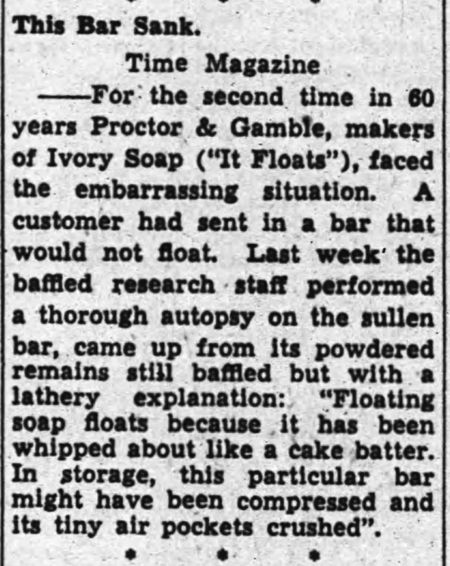
The Ottawa Journal - Oct 9, 1944
But that wasn't the only case. According to a June 20, 1954 article in the Cincinnati Enquirer there were, by that year, seven known cases of Ivory Soap sinkers:
The company revealed that since that time five other cakes of Ivory have, for mysterious and unaccountable reasons, gone to the bottom and stayed there. Scientists at the Procter & Gamble research laboratories explain that Ivory Soap floats because of the presence of tiny air bubbles, whipped into the soap when the mixture is molten — and in the case of the renegade bars, the tiny air bubbles are somehow missing.
"In the 75 years since Ivory Soap appeared, literally billions of bars have successfully floated," said a company spokesman. "Nevertheless, it appears that freaks of manufacturing will sometimes occur."
After 1954, I can't find any reported cases of sinking soap. Perhaps the manufacturing process improved. Or perhaps sinking soap was no longer deemed newsworthy.
Relevant to this topic — the idea of sinking Ivory Soap inspired one of the most famous New Yorker cartoons of all time. Penned in 1928 by Gluyas Williams, it was captioned, "Industrial Crisis: The day a cake of soap sank at Procter & Gamble's."
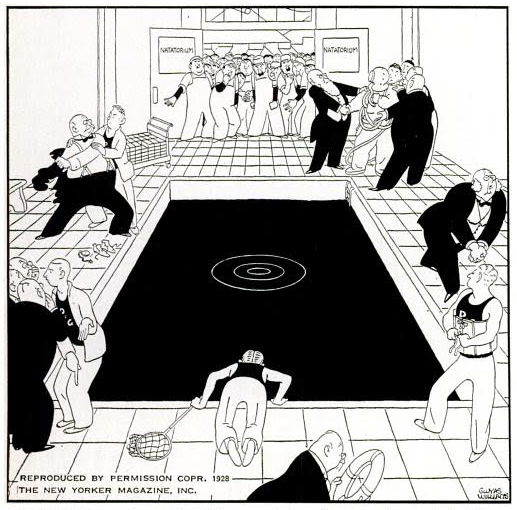
Industrial Crisis
Also, in 1990 (and again in 2001), P&G created 1101 special bars of Ivory Soap that were designed not to float. Consumers who were lucky enough to get one of these sinking bars could claim some kind of prize. Reportedly, it wasn't as easy as P&G had assumed to create the non-floaters. From the Houston Chronicle (Jan 25, 1990):
Sorry. Apparently the new machinery over the years had changed that simple formula. The bars still floated.
They tried other amounts of time. No go. Unlike the Bismarck, the Ivory refused to sink. Finally, they mixed and molded the soap by hand. That worked. Diving cakes occurred.
Posted By: Alex - Mon Dec 26, 2016 -
Comments (3)
Category:
Mystery Illustration 35

Which famous film star is this drawing intended to represent?
Answer after the jump.
More in extended >>
Posted By: Paul - Mon Dec 26, 2016 -
Comments (3)
Category: Celebrities, Movies, 1940s
December 25, 2016
News of the Weird (December 25, 2016)
News of the WeirdWeirdnuz.M507, December 25, 2016
Copyright 2016 by Chuck Shepherd. All rights reserved.
Lead Story
The rebellion against the absurdities of "Black Friday" this year by the organization Cards Against Humanity came in the form of raising money to dig a pointless hole in the ground. During the last week of November, people "contributed" $100,573, sending Cards digging initially for 5.5 seconds per donated dollar. In 2015, according to an NPR report, Cards raised $71,145 by promising to "do absolutely nothing" with it, and the year before, $180,000 by selling bits of bull feces. (Asked why Cards doesn't just give the money to charity, a spokesperson asked why donors themselves don't give it to charity. "It's [their] money.") [NPR via KUOW Radio (Turnwater, Wash.), 11-27-2016]
Government in Action
New York City's Department of Parks and Recreation has completed its two-year project of assigning ID numbers (with arboreal characteristics) to every one of the 685,781 trees in the city's five boroughs. More than 2,300 volunteers walked the streets, then posted each tree's location, measurements, Google Street View image, and ecological benefits for the surrounding neighborhoods (rainwater retained, air pollution reduced). (Privacy activists hope the National Security Agency is not inspired by this.) [Architecture Daily, 11-28-2016]
The Continuing Crisis
A note in the New York Times in October mentioned a website that comprehensively covers everything worth knowing and wondering--about shoelaces. Ian's Shoelace Site shows and discusses (and rates) lacing methods, how to mix lace colors, how to tie (comparing methods, variations, and, again, ratings), lengths of laces (how to calculate, which formulas to use, what to do with excess lengths), "granny knots," aglet repair, and much more--neatly laid out in dozens of foolproof drawings for the shoelace-challenged (because no one wants to be caught in a shoelace faux pas). [Ian's Shoelace Site]
Though the Presidential election of 2016 was certainly more volatile than usual, one reaction to the outcome was the apparent ease with which some in America's next generation of college-trained leaders were sidelined by self-described emotional pain. The Wall Street Journal reported that special attention was given by administrators at Tufts University, the University of Kansas, and Ivy League Cornell, among other places, where their young adults could "grieve" over the election and seek emotional support, such as use of Kansas's "therapy dogs" and, at University of Michigan, the availability of Play-Doh and coloring books for distraction. [Wall Street Journal, 11-9-2016]
Ironies
(1) The County Executive in Cleveland, Ohio, complained in November of lack of funds (because the county's credit is "maxed out") for necessary renovations to its well-known sports and concert venue, the Quicken Loans Arena. (2) In November, after a companion asked Victoria Vanatter, 19, what blood-sucking was like, she let him slice her arm with a razor to give him a taste, but the two then argued, and Vanatter allegedly grabbed a knife and slashed him for real. Police in Springfield, Mo., arrested her after both people were stitched up at a hospital. [Cleveland Sceue, 11-30-2016] [Springfield News Leader, 11-18-2016]
Recurring: The most recent city to schedule a civic-minded conference with community leaders to discuss options for affordable, accessible housing--in a meeting place that was highly unfriendly to the non-ambulatory--was Toronto, in November. The first proposed site required a seven-step walk-up, but following complaints, officials re-located it--to a building whose only rest room was in the elevator-free basement. [Toronto Star, 12-7-2016]
Questionable Judgments
The Space World theme park in Kitakyushu, Japan, opened a popular (with visitors) ice-skating rink in November but was forced to close it two weeks later for being hugely unpopular (with social media critics). The park had placed 5,000 fish and other sea animals in the ice deck of Its "Freezing Port" rink so that skaters could look down as they glided along, gazing at marvels of nature (all dead in advance, of course, purchased from a fish market). Nonetheless, the park manager apologized for grossing out so many people and closed the exhibit (melting the ice and conducting an "appropriate religious service" for the fishes' souls). [CNN, 11-28-2016]
The government-run TV Channel 2M in Morocco apologized for a segment of its daily program "Sabahiyat" that featured a makeup artist demonstrating techniques for obscuring blemishes on women subjected to domestic violence. The model being worked on had been made up with swollen face and faked bruises. Said the host, "We hope these beauty tips will help [victims] carry on with your daily life." (Bonus: The program aired November 23rd--two days before International Day for the Elimination of Violence Against Women.) [The Guardian (London), 11-27-2016]
Cunning Strategies: (1) Shogo Takeda, 24, said he desperately needed a job at the elevator maintenance company in Yokohama at which he was interviewing (with the president) on November 10th, but somehow could not resist taking the man's wallet from a bag when the president briefly left the room. (Takeda had dropped off his resume beforehand and thus was quickly apprehended.) (2) Mark Revill, 49, pleaded guilty in November to stalking the actor Keira Knightley. He said he had become frustrated that his flood of love letters was being ignored and so approached the front door of Knightley's London home and "meowed" through the letterbox. [Japan Times, 11-21-2016] [London Evening Standard, 11-21-2016]
Wait--You Mean This Is Illegal?
(1) A substitute teacher at Sandhills Middle School in Gaston, S.C., was charged with cruelty to children in December after she, exasperated, taped two kids to their desk chairs for misbehaving. (2) A second-grade teacher at Landis Elementary in Houston, Tex., was charged with felony cruelty after video showed her punching a serial troublemaker in the head as he fought her while she walked him to the principal's office. (3) A high-school teacher in Glasgow, Scotland, got in trouble in November for proposing in a journal that teachers be allowed to cuss back at students who cuss them. He wrote that limiting teachers to "Don't call me that" sends the wrong message. [The State (Columbia, S.C.), 12-3-2016] [KTRK-TV (Houston), 11-2-2016] [The Scottish Sun (Glasgow), 11-19-2016]
Recurring Themes
(1) Add goat horns to the "religious covering" items permitted to be worn in government identification cards. It took Mr. Phelan MoonSong of Millinocket, Maine, two trips to the DMV, but his ID, after his name change, was finally approved in December, based on his "Paganism" religion. (2) In December, a 21-year-old man became the most recent to fall to his death during a roadside "pit stop." Four passengers alighted from a car on the side of Interstate 15 near Escondido, Calif.; two urinators returned without incident, and a third also fell about 40 feet but survived. [WGME-TV (Portland), 12-6-2016] [San Diego Union-Tribune, 12-7-2016]
The Passing Parade
(1) In November, an arranged custody swap of a child, from one grandmother to another in a Walmart parking lot near Dallas, Tex., ended when both ladies pulled guns and started firing. One granny was hit in the neck and the other arrested after she also fired at an off-duty officer trying to calm things down. (2) A 22-year-old man pedaling a vending cart through downtown Victoria, British Columbia, in November with large-lettered "420 delivery" on the carrier was stopped by police and found with a stash of marijuana. (Selling recreational cannabis is illegal, even though the man had conscientiously printed, underneath "delivery," "NO MINORS.") [KDFW-TV (Dallas-Fort Worth), 11-30-2016] [Victoria Police Department release, 11-10-2016]
A News of the Weird Classic (February 2013)
Officials at Seaford, England's, 12th-century St. Peter's Church, which is renowned for its eerie quietness, created a 30-minute CD [in 2013] of "total silence," first as a small-scale fund-raising project but later for general sales (since word-of-mouth had attracted orders from the noise-annoyed as far away as Ghana). Those who have heard it said they could make out only the occasional squeaking of footsteps on the wooden floor and the very distant hum of a passing car. Said one admiring parishioner, "People sometimes like to sit down and just have a bit of peace and quiet." [Daily Mail (London), 1-27-2013]
Thanks This Week to Mark Hiester, Jay Sokolow, Damon Diehl, Mel Birge, and Randy Baker, and to the News of the Weird Board of Editorial Advisors.
Posted By: Chuck - Sun Dec 25, 2016 -
Comments (1)
Category:
Striking Santas

La Crosse Tribune - Dec 18, 1966

Hazleton Standard-Speaker - Nov 24, 1990
Posted By: Alex - Sun Dec 25, 2016 -
Comments (0)
Category: Riots, Protests and Civil Disobedience, Christmas
A Cosmic Christmas
Hideous aliens learn and reveal the true meaning of the holiday.
Hope all WU-vies experience the same!
Posted By: Paul - Sun Dec 25, 2016 -
Comments (0)
Category: Aliens, Holidays, Television
December 24, 2016
Surrealist Furniture
Italian sideboard, 1964, created by Fabio de Sanctis. Made from walnut wood and the doors of a Fiat 600. Titled "Cielo, Mare, Terra" (Sky, Sea, Land).Estimated cost: $15,500 - $18,800.
More info: dorotheum, Fondazione Fabio de Sanctis, artnet.

Posted By: Alex - Sat Dec 24, 2016 -
Comments (2)
Category: Furniture
Tiny Town, PA
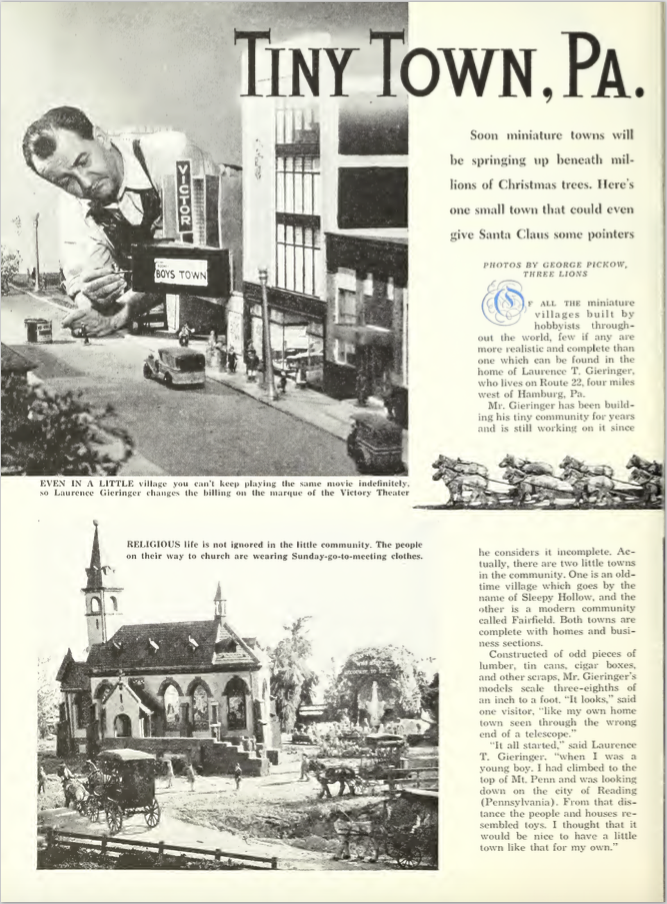

Homepage here.
News article here.
Posted By: Paul - Sat Dec 24, 2016 -
Comments (1)
Category: Eccentrics, Hobbies and DIY, Outsider Art, 1930s
December 23, 2016
Invisible Dog on a Leash
The most popular novelty item of 1972 was the "invisible dog on a leash."Credit for its invention goes to S. David Walker (the "S" stood for "Sir"), who in addition to being a mindreader and carnival pitchman was a prolific inventor of weird, useless stuff.
He first got wealthy selling Clackers — plastic spheres attached to a string which made a clacking sound when knocked together. Then he came up with the Invisible Dog on a Leash. According to a May 1, 1983 profile of him in the Salina Journal:
But the real moneymaker for Walker was his later invention of metallic balloons, which soon became more popular than everyday rubber balloons. Although, again, imitators eventually ended up making more money from them than he did.
Strangely, there seems to be almost no recognition of Walker's status as an inventor (except for that one article in the Salina Journal). Not even a wikipedia page about him.
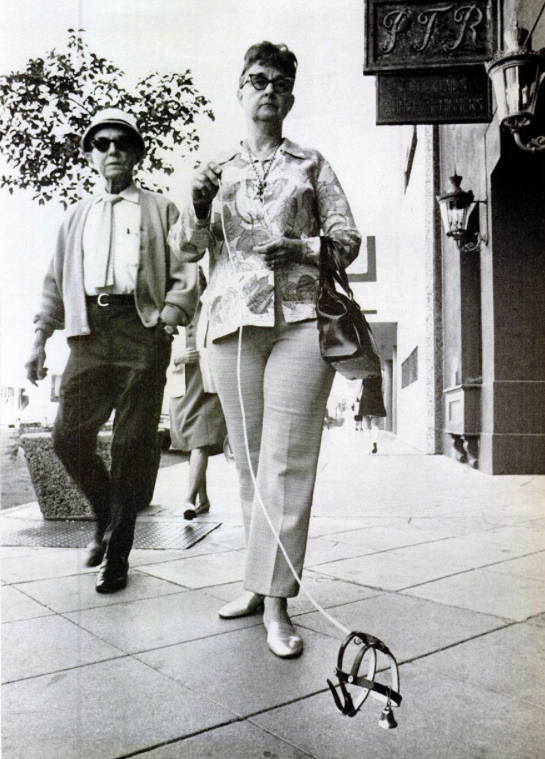
Life - July 21, 1972
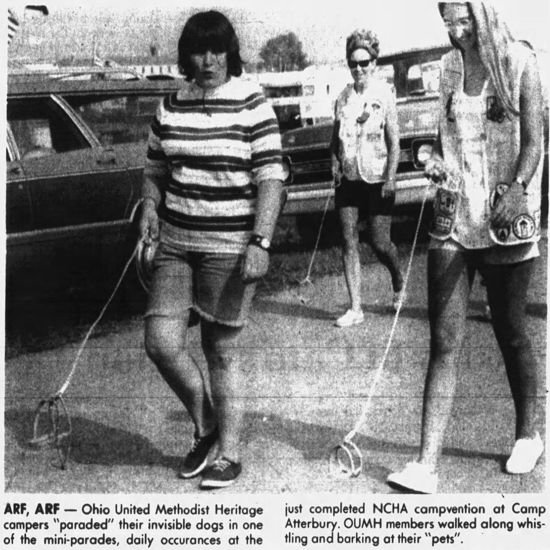
The Columbus Republic - Jul 14, 1972
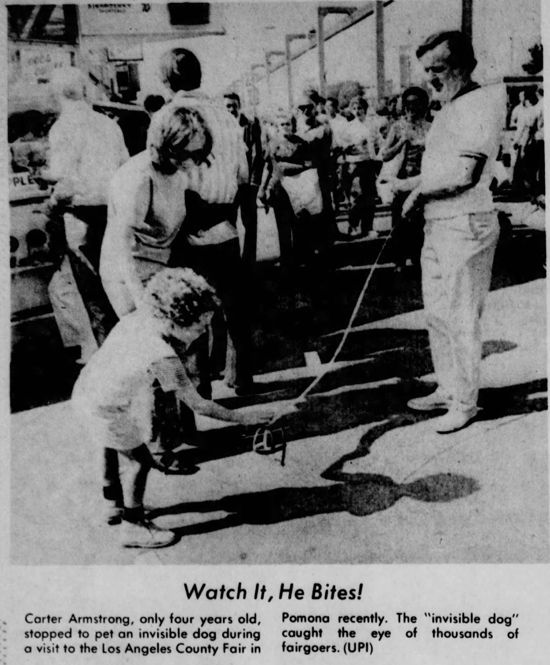
Sedalia Democrat - Sep 20, 1972
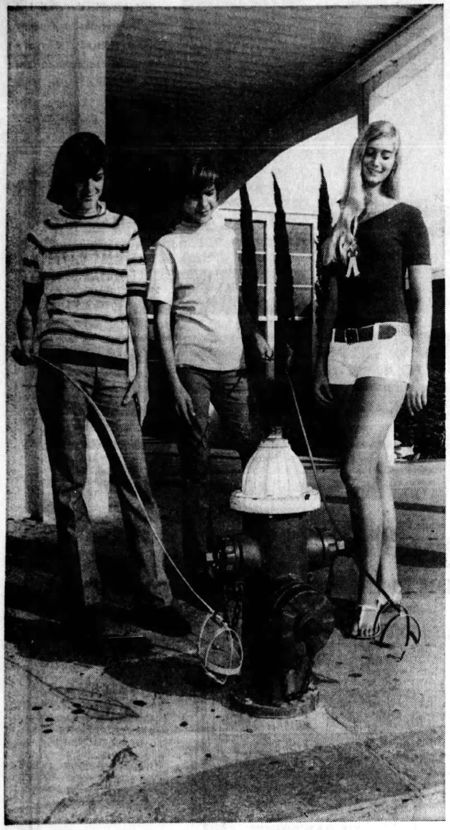
Fort Myers News-Press - Nov 12, 1972
Posted By: Alex - Fri Dec 23, 2016 -
Comments (3)
Category:
Zip Code Hootenanny
Posted By: Paul - Fri Dec 23, 2016 -
Comments (1)
Category: Music, PSA’s, 1960s, Postal Services
December 22, 2016
Santa Claus Keeps Dying
We've touched before on the theme of the death of Santa Claus, such as the metaphorical death of Santa portrayed in an ad, or a man who had changed his name to Santa finally giving up the ghost.However, there's another recurring weird news theme in which Santa Claus literally drops dead, often in front of a crowd of horrified children. What happens is that if you take a guy who's out of shape and overweight, dress him up in a hot costume, and make him do an unaccustomed level of exertion, the odds of him collapsing from a medical condition increase dramatically. Although Santas have also perished from non-medical causes (beard catching on fire, helicopter crash).
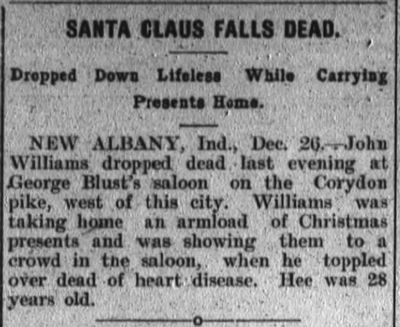
Fort Wayne Daily News - Dec 26, 1898
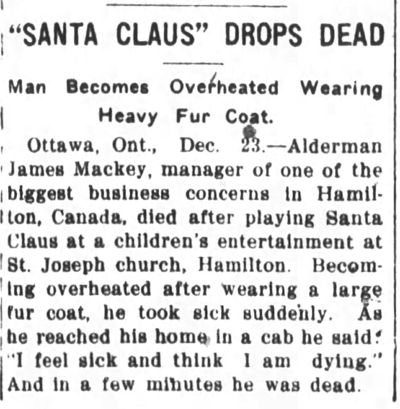
Belvidere Daily Republican - Dec 23, 1912
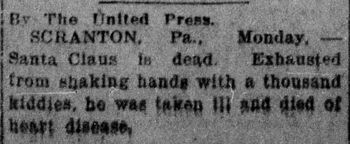
Taylor Daily Press - Dec 27, 1920
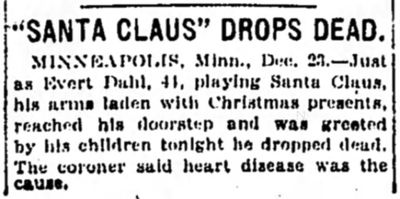
Indianapolis Star - Dec 24, 1922
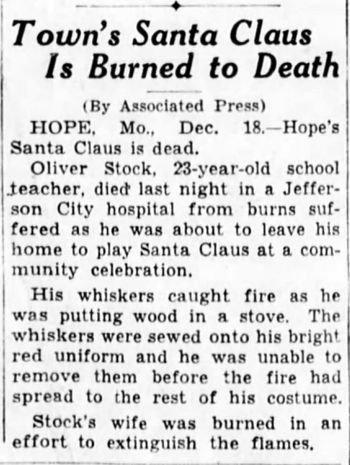
San Bernardino County Sun - Dec 19, 1932
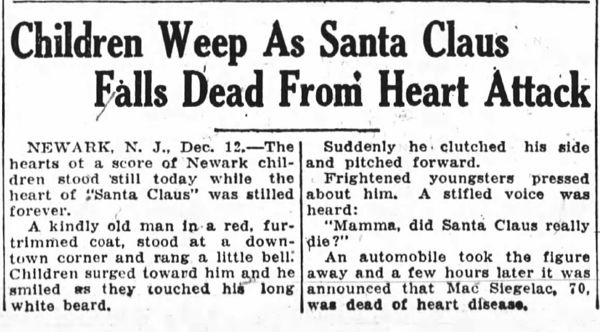
Oakland Tribune - Dec 13, 1925
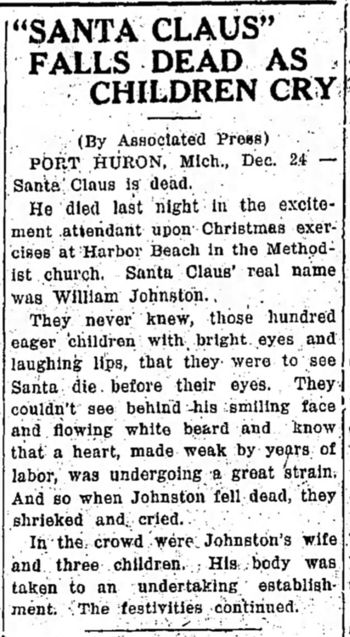
Carbondale Daily Free Press - Dec 26, 1925
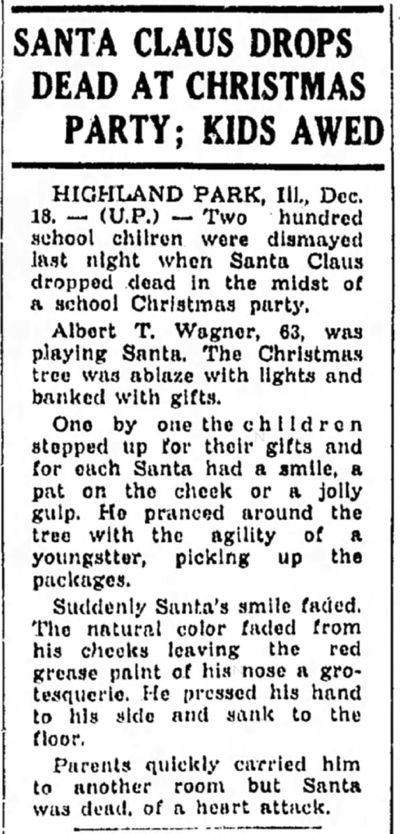
Hammond Times - Dec 19, 1937
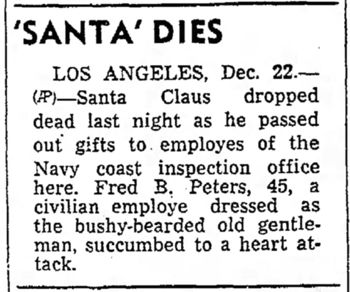
Abilene Reporter-News - Dec 23, 1945

Rushville Republican - Dec 11, 1967

Louisville Courier-Journal - Dec 7, 1983
Posted By: Alex - Thu Dec 22, 2016 -
Comments (3)
Category: Christmas
| Get WU Posts by Email | |
|---|---|

| Who We Are |
|---|
| Alex Boese Alex is the creator and curator of the Museum of Hoaxes. He's also the author of various weird, non-fiction books such as Elephants on Acid. Paul Di Filippo Paul has been paid to put weird ideas into fictional form for over thirty years, in his career as a noted science fiction writer. He has recently begun blogging on many curious topics with three fellow writers at The Inferior 4+1. Chuck Shepherd Chuck is the purveyor of News of the Weird, the syndicated column which for decades has set the gold-standard for reporting on oddities and the bizarre. Our banner was drawn by the legendary underground cartoonist Rick Altergott. Contact Us |

